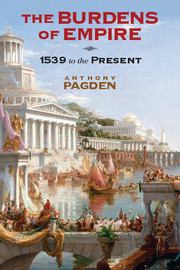Book contents
- Frontmatter
- Dedication
- Contents
- Preface
- Acknowledgements
- Introduction: Anatomy of Empire from Rome to Washington
- 1 Defending Empire: The School of Salamanca and the ‘Affair of the Indies’
- 2 ‘Making Barbarians into Gentle Peoples’: Alberico Gentili on the Legitimacy of Empire
- 3 The Peopling of the New World: Ethnos, Race, and Empire in the Early-Modern World
- 4 Conquest, Settlement, Purchase, and Concession: Justifying the English Occupation of the Americas
- 5 Occupying the Ocean: Hugo Grotius and Serafim de Freitas on the Rights of Discovery and Occupation
- 6 Cambiar su ser: Reform to Revolution in the Political Imaginary of the Ibero-American World
- 7 From the “Right of Nations” to the “Cosmopolitan Right”: Immanuel Kant's Law of Continuity and the Limits of Empire
- 8 “Savage Impulse-Civilized Calculation”: Conquest, Commerce, and the Enlightenment Critique of Empire
- 9 Human Rights, Natural Rights, and Europe's Imperial Legacy
- Bibliography
- Index
7 - From the “Right of Nations” to the “Cosmopolitan Right”: Immanuel Kant's Law of Continuity and the Limits of Empire
Published online by Cambridge University Press: 05 March 2015
- Frontmatter
- Dedication
- Contents
- Preface
- Acknowledgements
- Introduction: Anatomy of Empire from Rome to Washington
- 1 Defending Empire: The School of Salamanca and the ‘Affair of the Indies’
- 2 ‘Making Barbarians into Gentle Peoples’: Alberico Gentili on the Legitimacy of Empire
- 3 The Peopling of the New World: Ethnos, Race, and Empire in the Early-Modern World
- 4 Conquest, Settlement, Purchase, and Concession: Justifying the English Occupation of the Americas
- 5 Occupying the Ocean: Hugo Grotius and Serafim de Freitas on the Rights of Discovery and Occupation
- 6 Cambiar su ser: Reform to Revolution in the Political Imaginary of the Ibero-American World
- 7 From the “Right of Nations” to the “Cosmopolitan Right”: Immanuel Kant's Law of Continuity and the Limits of Empire
- 8 “Savage Impulse-Civilized Calculation”: Conquest, Commerce, and the Enlightenment Critique of Empire
- 9 Human Rights, Natural Rights, and Europe's Imperial Legacy
- Bibliography
- Index
Summary
I
From Francisco de Vitoria until the Swiss jurist and diplomat Emer de Vattel, whose Law of Nations or Principles of the Law of Nature, Applied to the Conduct and Affairs of Nations and Sovereigns of 1757 became a textbook of the law of nations in the second half of the eighteenth century, every attempt to justify and regulate empire and colonization had been expressed in terms of the later Roman jurists’ understanding of the “law of nations”. This, as we have seen, was understood to be a secondary natural law, identifiable with what the eighteenth-century German philosopher and mathematician Christian Wolff described as that law which all nations “are bound to agree upon if following the leadership of nature they use right reason,” which in practice could only amount to “what has been approved by the more civilized nations”. But Wolf's The Law of Nations, Treated According to a Scientific Method of 1750 was not only the longest attempt to provide an exhaustive definition of the law of nations but also one of the last. By the first decades of the nineteenth century the project had been largely abandoned, along with the entire conception of the “law of nature”. In its place came a new positive “international law” – a term coined by Jeremy Bentham, one of the fiercest opponents of the idea of natural law and natural rights in 1783. One of the key figures in this transition was Immanuel Kant.
Kant was famously dismissive of what he called the “sorry comforters” of mankind – Hugo Grotius, Samuel Pufendorf, Emer de Vattel – “and the like” – in effect, the entire tradition of thinking on the “law of nations”, which had preceded him. For, in his view, their “code, couched philosophically or diplomatically”, could never have any legal force in the state of nature in which all the nations of the world in his day still existed, because none of them were “subject to a common external constraint”.
- Type
- Chapter
- Information
- The Burdens of Empire1539 to the Present, pp. 201 - 223Publisher: Cambridge University PressPrint publication year: 2015



